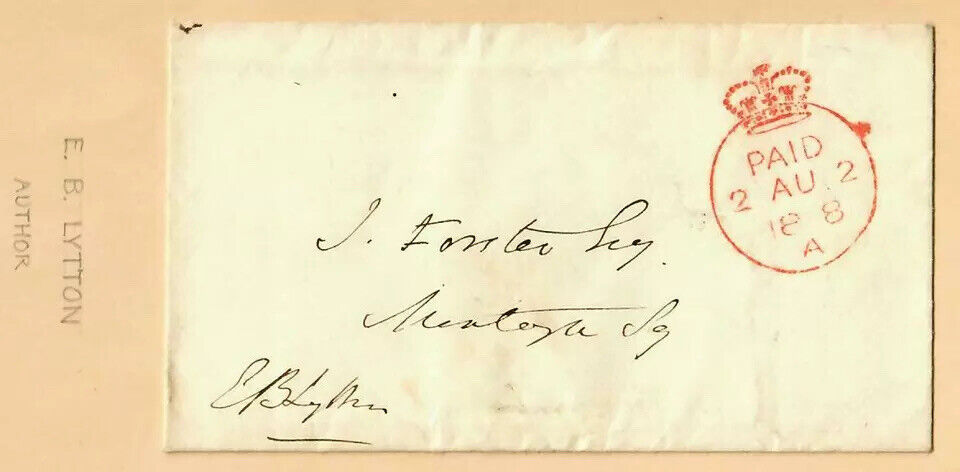When you click on links to various merchants on this site and make a purchase, this can result in this site earning a commission. Affiliate programs and affiliations include, but are not limited to, the eBay Partner Network.
Up for sale "1st Baron Lytton" Edward Bulwer-Lytton Hand Signed Free Frank. This docuemnt is affixed to a 5.5X9 Monogramed Card.
ES-7376E
Edward
George Earle Lytton Bulwer-Lytton, 1st Baron Lytton, PC (25 May 1803 – 18 January 1873)
was an English writer and politician. He served as a Whig member
of Parliament from 1831 to 1841 and a Conservative from
1851 to 1866. He was Secretary of
State for the Colonies from June 1858 to June 1859,
choosing Richard Clement Moody as
founder of British Columbia. He declined the Crown of Greece in 1862
after King Otto abdicated.
He was created Baron Lytton of Knebworth in 1866. His marriage to the
writer Rosina Bulwer Lytton broke
down. Her detention in an insane asylum provoked
a public outcry. Bulwer-Lytton's works sold and paid him well. He coined the
phrases "the great unwashed", "pursuit of the almighty
dollar", "the pen is mightier than
the sword", and "dweller on the threshold",
and the opening phrase "It was a dark and stormy
night." Yet his standing declined and he is little read today.[
The sardonic Bulwer-Lytton Fiction
Contest, held annually since 1982, claims to seek the "opening
sentence of the worst of all possible novels". Bulwer was born on 25 May
1803 to General William Earle Bulwer of Heydon Hall and Wood Dalling, Norfolk and Elizabeth Barbara Lytton,
daughter of Richard Warburton Lytton of Knebworth House, Hertfordshire. He had two older brothers,
William Earle Lytton Bulwer (1799–1877) and Henry (1801–1872),
later Lord Dalling and Bulwer.
His father died and his mother moved to London when he was four years
old. When he was 15, a tutor named Wallington, who tutored him at Ealing,
encouraged him to publish an immature work: Ishmael and Other Poems.
Around this time, Bulwer fell in love, but the woman's father induced her to
marry another man. She died about the time that Bulwer went to Cambridge and he
stated that her loss affected all his subsequent life. In 1822 Bulwer-Lytton entered Trinity College,
Cambridge, where he met John Auldjo, but soon moved to Trinity Hall. In 1825 he won the Chancellor's Gold Medal for English verse. In the following year he took
his BA degree and printed for private circulation a small
volume of poems, Weeds and Wild Flowers. He purchased an army
commission in 1826, but sold it in 1829 without serving. In August 1827, he married Rosina Doyle
Wheeler (1802–1882), a noted Irish beauty, but against the
wishes of his mother, who withdrew his allowance, forcing him to work for a
living. They had two children, Emily Elizabeth Bulwer-Lytton (1828–1848),
and (Edward) Robert Lytton Bulwer-Lytton, 1st Earl of Lytton (1831–1891)
who became Governor-General and Viceroy of
British India (1876–1880). His writing and political work
strained their marriage and his infidelity embittered Rosina. In 1833 they
separated acrimoniously and in 1836 the separation became legal. Three
years later, Rosina published Cheveley, or the Man of Honour (1839),
a near-libellous fiction satirising her husband's alleged hypocrisy. In
June 1858, when her husband was standing as parliamentary candidate for
Hertfordshire, she denounced him at the hustings. He retaliated by threatening her publishers,
withholding her allowance and denying her access to their children. Finally
he had her committed to a mental asylum, but she was released a few weeks
later after a public outcry. This she chronicled in a memoir, A Blighted Life (1880). She continued attacking her
husband's character for several years. The death of Bulwer's mother in 1843
meant his "exhaustion of toil and study had been completed by great
anxiety and grief," and by "about the January of 1844, I was
thoroughly shattered." In his mother's room at Knebworth House, which he
inherited, he "had inscribed above the mantelpiece a request that future
generations preserve the room as his beloved mother had used it." It remains
hardly changed to this day. On 20 February 1844, in accordance with his
mother's will, he changed his surname from Bulwer to Bulwer-Lytton and assumed
the arms of Lytton by royal licence. His widowed mother had done the same in
1811. His brothers remained plain "Bulwer". By chance Bulwer-Lytton
encountered a copy of "Captain Claridge's work
on the "Water Cure", as
practised by Priessnitz, at
Graefenberg", and "making allowances for certain exaggerations
therein", pondered the option of travelling to Graefenberg, but preferred
to find something closer to home, with access to his own doctors in case of
failure: "I who scarcely lived through a day without leech or
potion!". After reading a pamphlet by Doctor James Wilson, who
operated a hydropathic establishment with James Manby Gully at Malvern, he stayed there
for "some nine or ten weeks", after which he "continued the
system some seven weeks longer under Doctor Weiss, at Petersham", then again at "Doctor Schmidt's
magnificent hydropathic establishment at Boppart" (at the former
Marienberg Convent at Boppard), after developing a cold and
fever upon his return home.
When Otto, King of Greece abdicated
in 1862, Bulwer-Lytton was offered the Greek Crown, but declined. founded in 1867
by Robert Wentworth Little,
claimed Bulwer-Lytton as their "Grand Patron", but he wrote to the
society complaining that he was "extremely surprised" by their use of
the title, as he had "never sanctioned such. Nevertheless, a number
of esoteric groups have continued to claim Bulwer-Lytton as their own, chiefly
because some of his writings – such as the 1842 book Zanoni – have included Rosicrucian and other esoteric
notions. According to the Fulham Football Club, he once resided in the original Craven Cottage, today the site of their stadium. Bulwer-Lytton
had long suffered from a disease of the ear, and for the last two or three
years of his life lived in Torquay nursing his health. After
an operation to cure deafness, an abscess formed in the ear and
burst; he endured intense pain for a week and died at 2 am on 18 January
1873, just short of his 70th birthday. The cause of death was unclear but
it was thought the infection had affected his brain and caused a fit. Rosina
outlived him by nine years. Against his wishes, Bulwer-Lytton was honoured with
a burial in Westminster Abbey.[20] His unfinished history Athens: Its
Rise and Fall was published posthumously.









